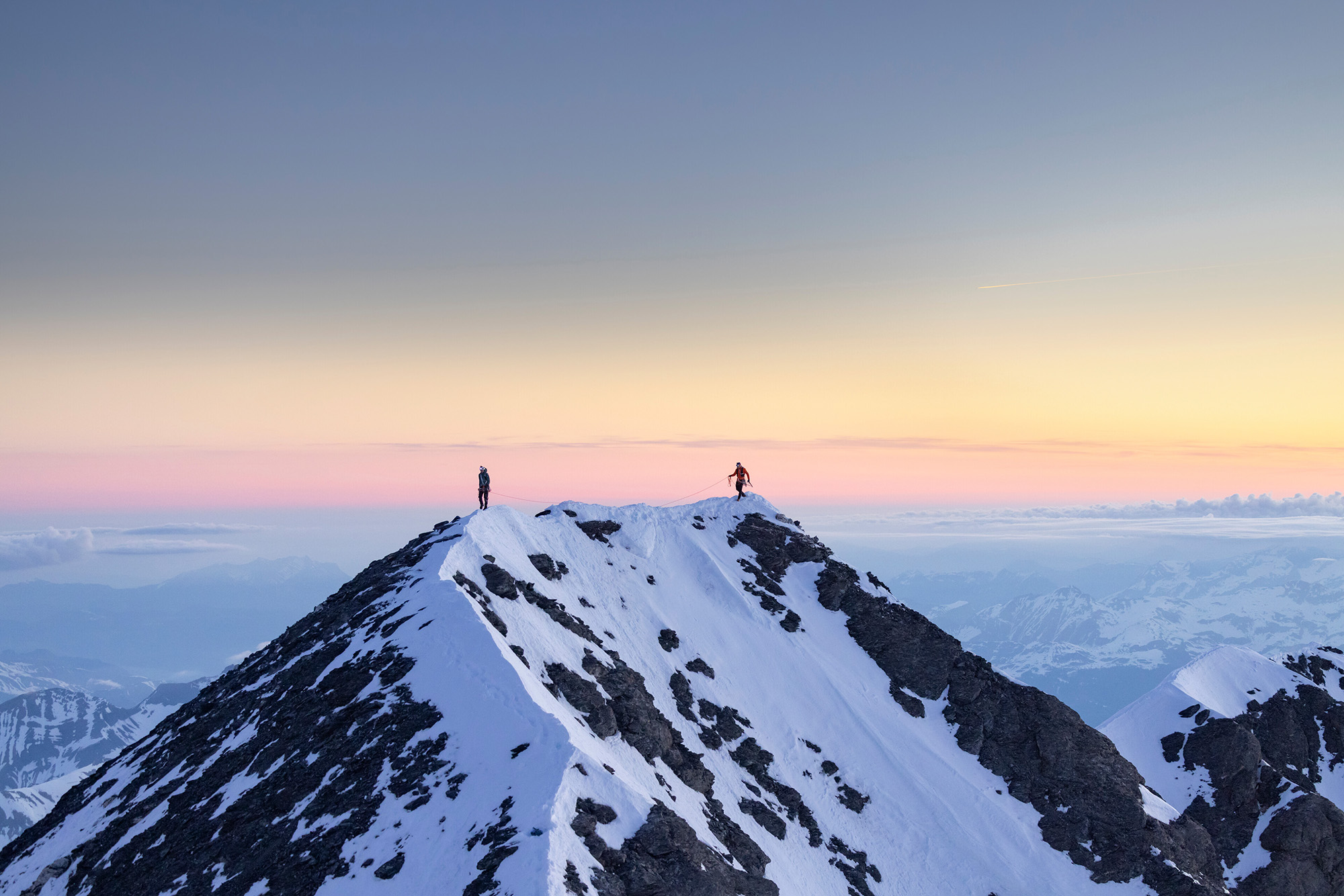Swiss-Austrian duo break 21-year-old speed climbing record in the Bernese Alps
Nicolas Hojac and Philipp Brugger summit Eiger, Mönch, and Jungfrau, shaving nearly 10 hours off the previous record
Swiss climber Nicolas Hojac and Austrian partner Philipp Brugger have set a new speed record in the Swiss Alps, completing one of mountaineering’s most legendary endurance feats: climbing the north faces of the Eiger, Mönch and Jungfrau – three of the most iconic and challenging peaks in the Bernese Alps – in just 15 hours and 30 minutes.

The feat, completed on 5 April 2025 with the aim of summiting all three peaks in under 24 hours, breaks the long-standing record of 25 hours set by Swiss alpinists Ueli Steck and Stephan Siegrist in 2004 – both widely regarded as pioneers in the field.
The 80/20 Snapshot:
- 21-Year-Old Record Broken: Nicolas Hojac and Philipp Brugger set a new speed record, summiting the Eiger, Mönch, and Jungfrau in 15 hours and 30 minutes, breaking the previous 2004 record of 25 hours.
- The Challenge: The climbers tackled one of mountaineering’s toughest endurance feats, covering vast vertical distances of rock, snow, and ice in a single, non-stop push.
- Strategic Moves: Starting in darkness, they reached the summit of the Eiger in 5 hours and 43 minutes – an ascent that typically takes amateur climbers one to two full days – before moving on to the Mönch and Jungfrau.
- Overcoming Obstacles: A critical gear mishap at the Mönch’s Schulterstand section forced the duo to improvise and rely on creative techniques to continue their climb.
- Personal Triumphs: Brugger made an emotional comeback after recovering from a serious health scare, while Hojac honoured his late mentor, Ueli Steck, the original record holder, who passed away in 2017.


Deep Dive
Known collectively as the “Bernese trilogy,” the three peaks tower above the Bernese Oberland region of Switzerland. Each mountain poses its own terrain-specific tests, but the true test lies in linking them in a single, non-stop push – covering significant vertical distance across technical rock, snow, and ice, and doing so at high altitude with minimal rest.
Hojac and Brugger began their ascent in complete darkness at 01:00 local time, starting with the Eiger – the most notorious of the trio, famed for its daunting 1,800-metre-high north face. Using the Heckmair Route, named after the climber who completed the first ascent in 1938, they reached the summit in just 5 hours and 43 minutes – an ascent that typically takes amateur climbers one to two full days.
From there, after a five-minute break, they descended to the base of the Mönch and tackled the Lauper Route – a historic line first climbed in 1932. At one section known as the Schulterstand – a German term meaning “shoulder stand,” referencing the early climbing technique where one mountaineer stood on another’s shoulders – the pair were forced to improvise after discovering that the sling, a crucial piece of gear used to anchor the rope, was missing.

“It was only with creative techniques and teamwork that we were able to successfully complete this section,” Hojac said.
After reaching Jungfraujoch, a high-altitude railway station located between the Mönch and Jungfrau, the pair took a short break. Facilities maintenance workers at the High Altitude Research Stations had prepared a surprise for the two climbers: a serving of French fries, fuelling their push to the third summit.
The final ascent of the day was the 4,158-metre Jungfrau. Despite exhaustion, the duo reached the summit at 16:30, capping off a day of relentless climbing in mixed alpine conditions. Their total time – 15 hours and 30 minutes – is nearly ten hours faster than the previous record.
“This record feels completely surreal to me,” Hojac remarked. “We would have been very satisfied with 19 to 21 hours. The fact that we managed it in even less time shows that we’re all often capable of more than we think”, he added.

The effort marks a personal comeback for Brugger, who suffered a serious health scare just a year earlier. “It was a really emotional moment for me”, he stated. “We’ve been wanting to take on this project together for a year now, but then I experienced a perforated bowel. I never would have thought that I would be standing on the Jungfrau with Nico one year later.”
Also for Hojac, the moment carried special weight. The original record holder, Ueli Steck, was a close friend, climbing partner, and mentor. Steck, nicknamed the “Swiss Machine” for his stamina and precision, was one of the most accomplished speed climbers in history before his death during an expedition in 2017.
“Ueli and Stephan were pioneers back then. It’s always most difficult for the people who do it first, and most importantly, it was their idea,” Hojac commented. (Red Bull Content Pool)








You must be logged in to post a comment.